
LLMSpeculativeSampling
Fast inference from large lauguage models via speculative decoding
Stars: 468
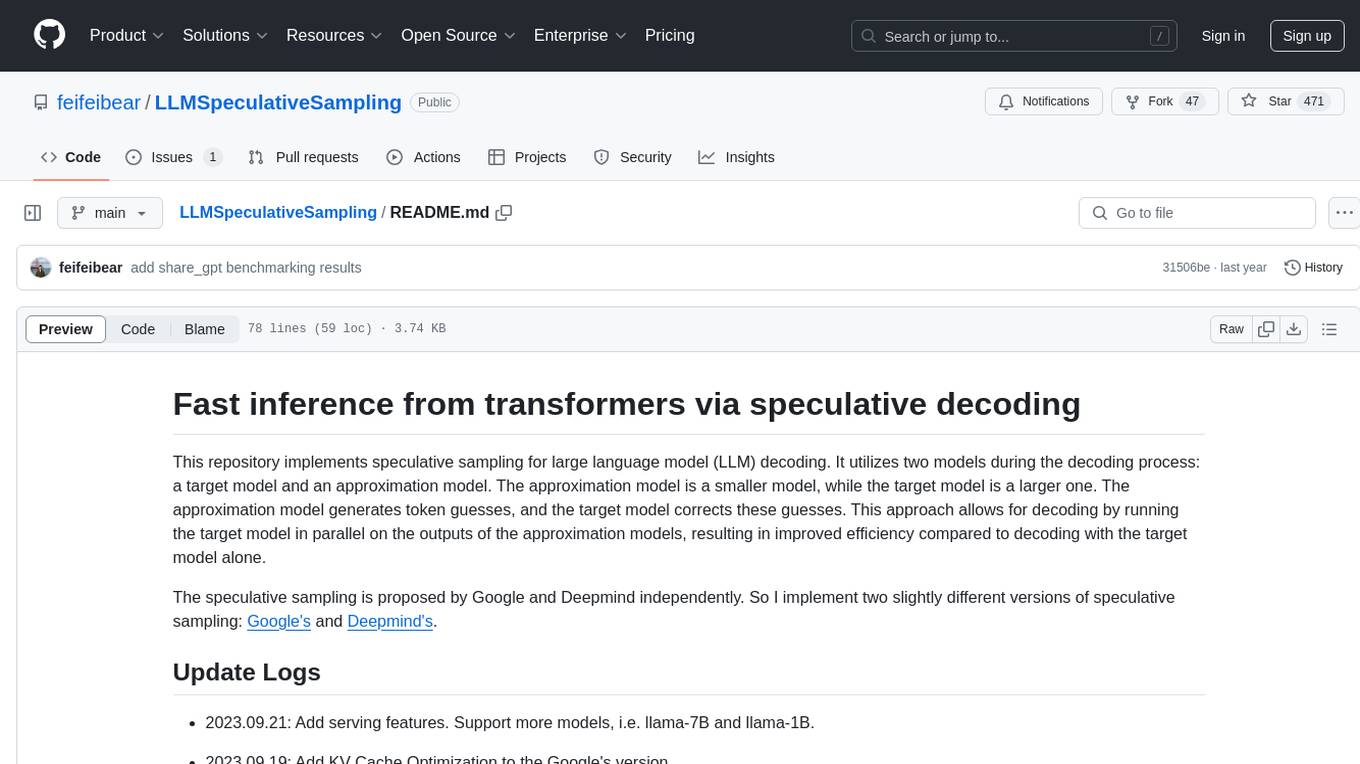
This repository implements speculative sampling for large language model (LLM) decoding, utilizing two models - a target model and an approximation model. The approximation model generates token guesses, corrected by the target model, resulting in improved efficiency. It includes implementations of Google's and Deepmind's versions of speculative sampling, supporting models like llama-7B and llama-1B. The tool is designed for fast inference from transformers via speculative decoding.
README:
This repository implements speculative sampling for large language model (LLM) decoding. It utilizes two models during the decoding process: a target model and an approximation model. The approximation model is a smaller model, while the target model is a larger one. The approximation model generates token guesses, and the target model corrects these guesses. This approach allows for decoding by running the target model in parallel on the outputs of the approximation models, resulting in improved efficiency compared to decoding with the target model alone.
The speculative sampling is proposed by Google and Deepmind independently. So I implement two slightly different versions of speculative sampling: Google's and Deepmind's.
-
2023.09.21: Add serving features. Support more models, i.e. llama-7B and llama-1B.
-
2023.09.19: Add KV Cache Optimization to the Google's version.
-
2023.08.16: First release, implement the paper's algorithm. Support Bloom-560M and Bloomz-7B1.
You need prepare a pair of models using the same embedding and vocabulary. The approximation model should be smaller than the target model. Here are some tested model pairs.
In the sample, we demostrate bloomz-7b1 as the target model, bloom-560m as the approximation model.
python main.py \
--input "The quick brown fox jumps over the lazy " \
--target_model_name bigscience/bloomz-7b1 \
--approx_model_name bigscience/bloom-560mYou can also use -v args to see a token is generated by which model.
I recommand you to use llama2-7B and llama2-70B as the approximation and target model respectively. I did observe speedup on this case as shown in the following. Note the choice of approx model and target model are essential for the speedup. The speedup will not be observed in the following cases: If the models are both small ones, the speedup will not be observed since the speed differences are not significant. If the model size difference is too large, more rejection and resampling will occure. Also the sampling logic is not efficient enough. I noticed substantial overhead is on Softmax and Layernorm. I will try to optimize it in the future. Do not histant to open an idea on performance improvements.
| llama2-7b | llama2-70b | Speculative | |
|---|---|---|---|
| speed(tokens/sec) | 1084.86 | 329.83 | 427.02 |
Start an inference server.
python serving.pyTest the serving with curl:
curl -X POST -H "Content-Type: application/json" -d '{"prompt": "Who is the president of the USA"}' http://127.0.0.1:5000/predict@inproceedings{leviathan2023fast,
title={Fast inference from transformers via speculative decoding},
author={Leviathan, Yaniv and Kalman, Matan and Matias, Yossi},
booktitle={International Conference on Machine Learning},
pages={19274--19286},
year={2023},
organization={PMLR}
}
@article{chen2023accelerating,
title={Accelerating large language model decoding with speculative sampling},
author={Chen, Charlie and Borgeaud, Sebastian and Irving, Geoffrey and Lespiau, Jean-Baptiste and Sifre, Laurent and Jumper, John},
journal={arXiv preprint arXiv:2302.01318},
year={2023}
}
Currently, I only support request of batch size as 1. Since this repo is built for demostration purpose, other optimizations, such as batching and parallelism, are not included which are essential for efficiency.
For Tasks:
Click tags to check more tools for each tasksFor Jobs:
Alternative AI tools for LLMSpeculativeSampling
Similar Open Source Tools

LLMSpeculativeSampling
This repository implements speculative sampling for large language model (LLM) decoding, utilizing two models - a target model and an approximation model. The approximation model generates token guesses, corrected by the target model, resulting in improved efficiency. It includes implementations of Google's and Deepmind's versions of speculative sampling, supporting models like llama-7B and llama-1B. The tool is designed for fast inference from transformers via speculative decoding.
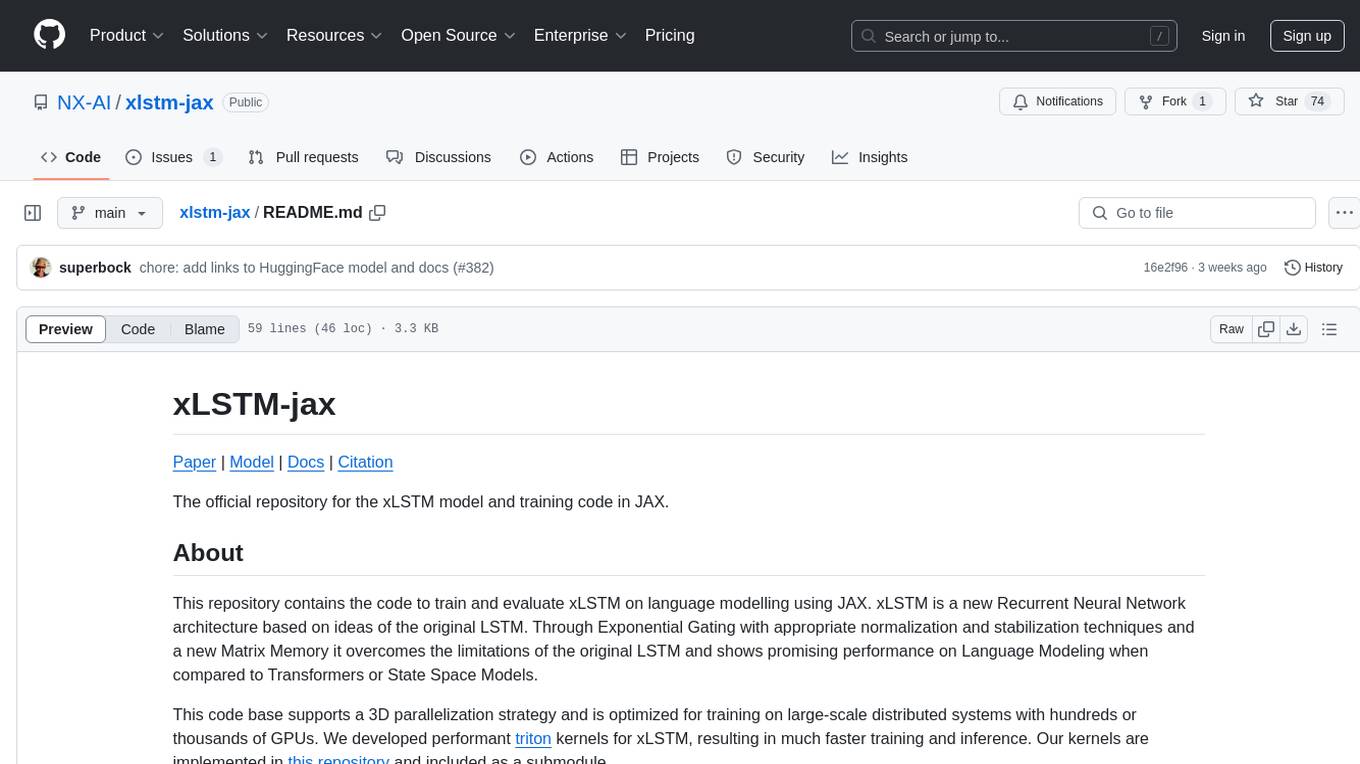
xlstm-jax
The xLSTM-jax repository contains code for training and evaluating the xLSTM model on language modeling using JAX. xLSTM is a Recurrent Neural Network architecture that improves upon the original LSTM through Exponential Gating, normalization, stabilization techniques, and a Matrix Memory. It is optimized for large-scale distributed systems with performant triton kernels for faster training and inference.
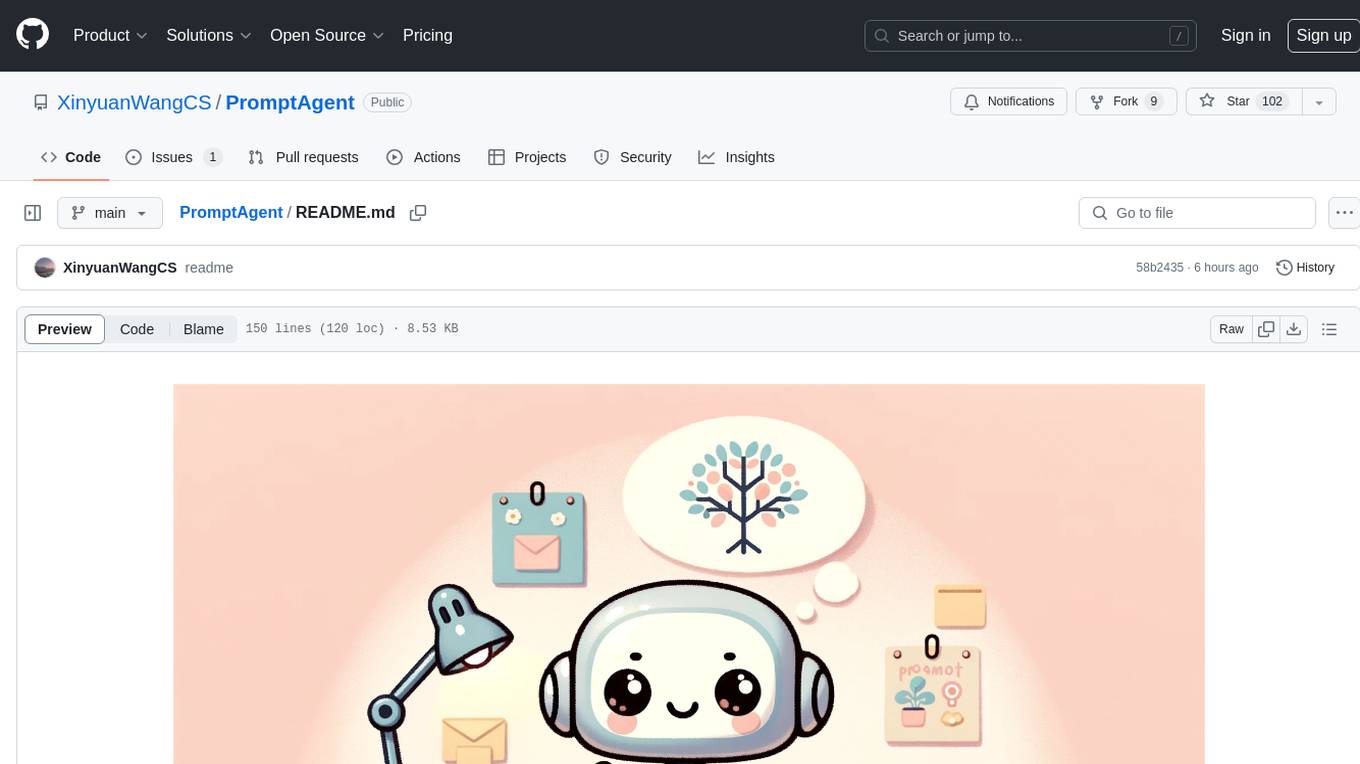
PromptAgent
PromptAgent is a repository for a novel automatic prompt optimization method that crafts expert-level prompts using language models. It provides a principled framework for prompt optimization by unifying prompt sampling and rewarding using MCTS algorithm. The tool supports different models like openai, palm, and huggingface models. Users can run PromptAgent to optimize prompts for specific tasks by strategically sampling model errors, generating error feedbacks, simulating future rewards, and searching for high-reward paths leading to expert prompts.
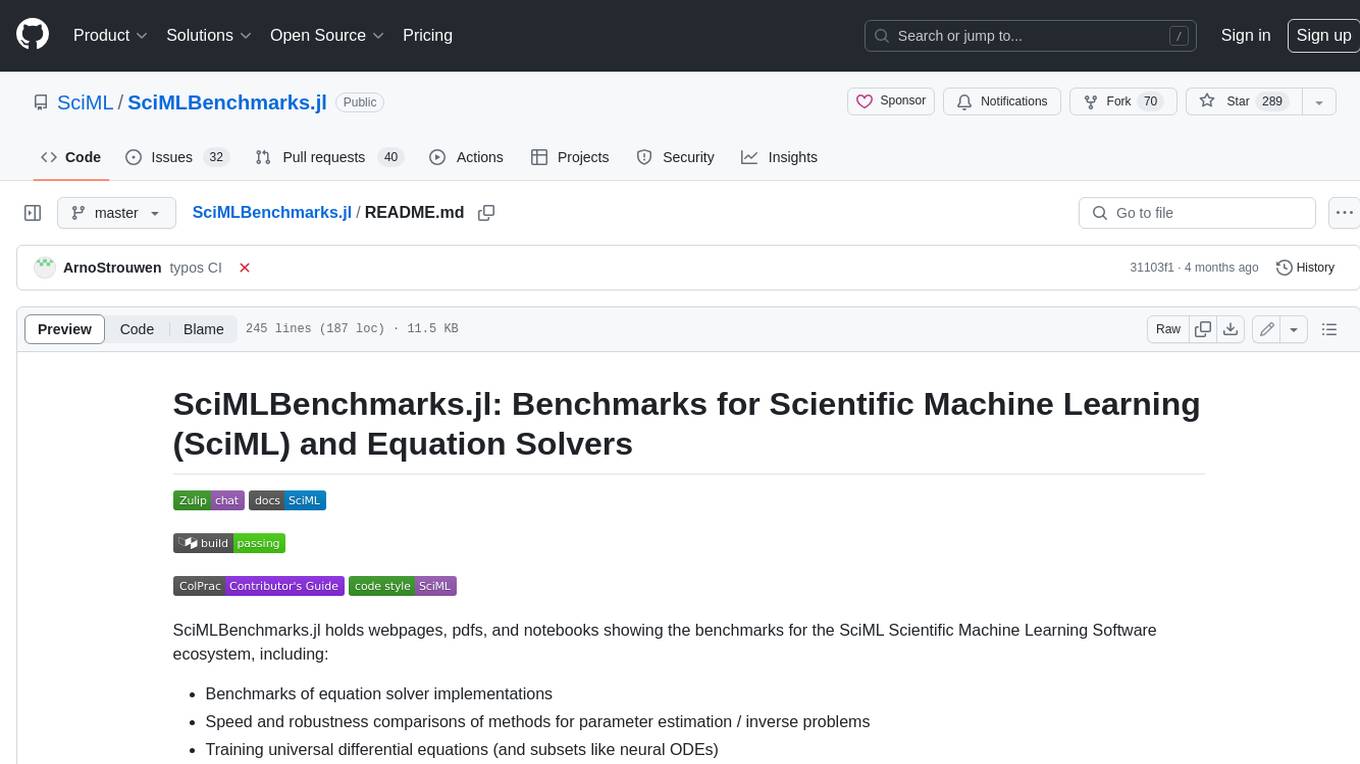
SciMLBenchmarks.jl
SciMLBenchmarks.jl holds webpages, pdfs, and notebooks showing the benchmarks for the SciML Scientific Machine Learning Software ecosystem, including: * Benchmarks of equation solver implementations * Speed and robustness comparisons of methods for parameter estimation / inverse problems * Training universal differential equations (and subsets like neural ODEs) * Training of physics-informed neural networks (PINNs) * Surrogate comparisons, including radial basis functions, neural operators (DeepONets, Fourier Neural Operators), and more The SciML Bench suite is made to be a comprehensive open source benchmark from the ground up, covering the methods of computational science and scientific computing all the way to AI for science.
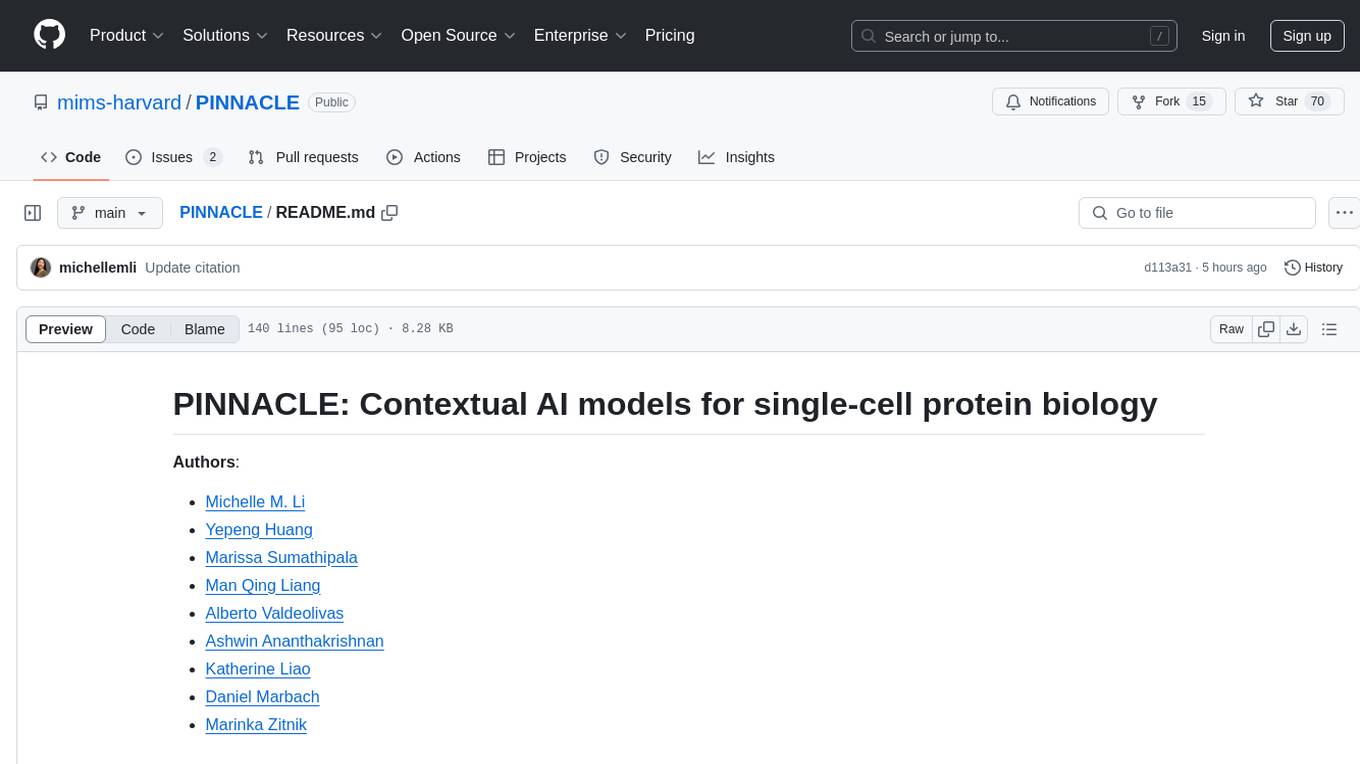
PINNACLE
PINNACLE is a flexible geometric deep learning approach that trains on contextualized protein interaction networks to generate context-aware protein representations. It provides protein representations split across various cell-type contexts from different tissues and organs. The tool can be fine-tuned to study the genomic effects of drugs and nominate promising protein targets and cell-type contexts for further investigation. PINNACLE exemplifies the paradigm of incorporating context-specific effects for studying biological systems, especially the impact of disease and therapeutics.
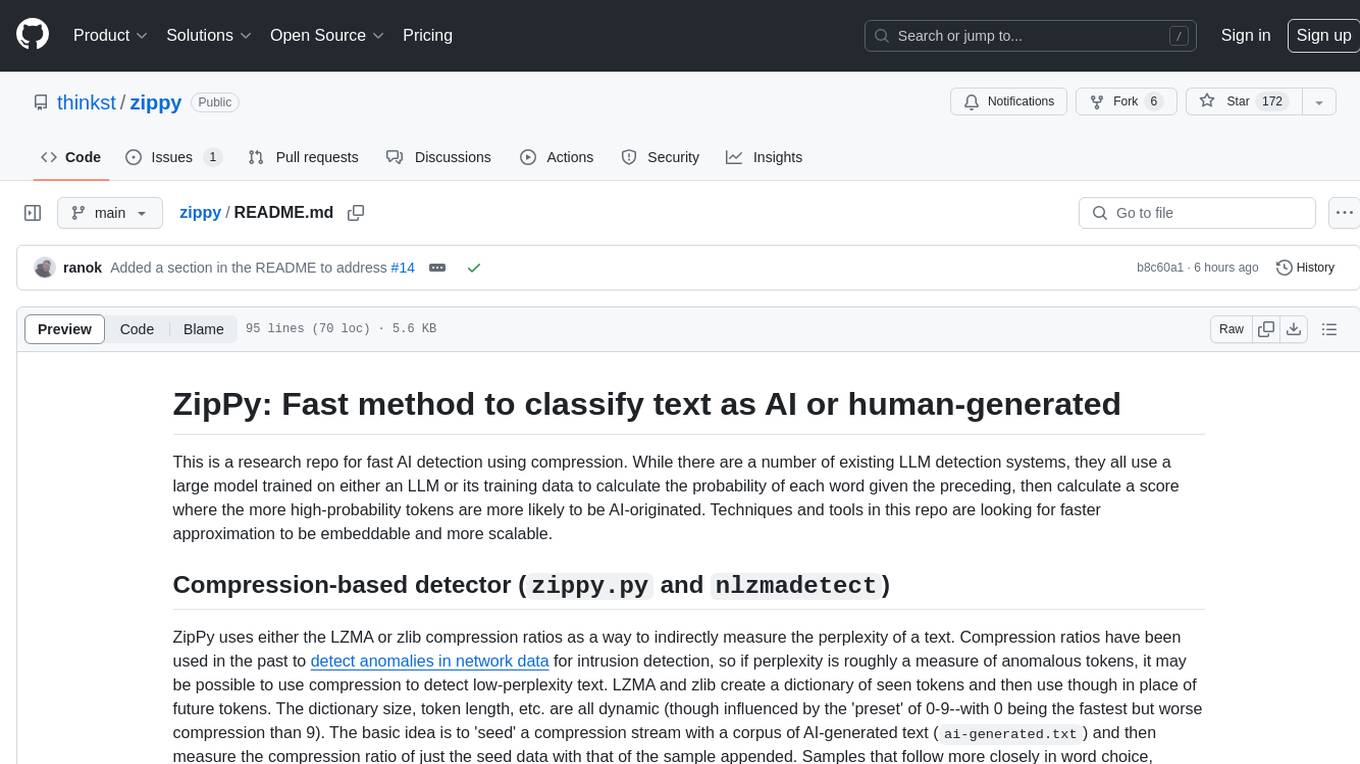
zippy
ZipPy is a research repository focused on fast AI detection using compression techniques. It aims to provide a faster approximation for AI detection that is embeddable and scalable. The tool uses LZMA and zlib compression ratios to indirectly measure the perplexity of a text, allowing for the detection of low-perplexity text. By seeding a compression stream with AI-generated text and comparing the compression ratio of the seed data with the sample appended, ZipPy can identify similarities in word choice and structure to classify text as AI or human-generated.
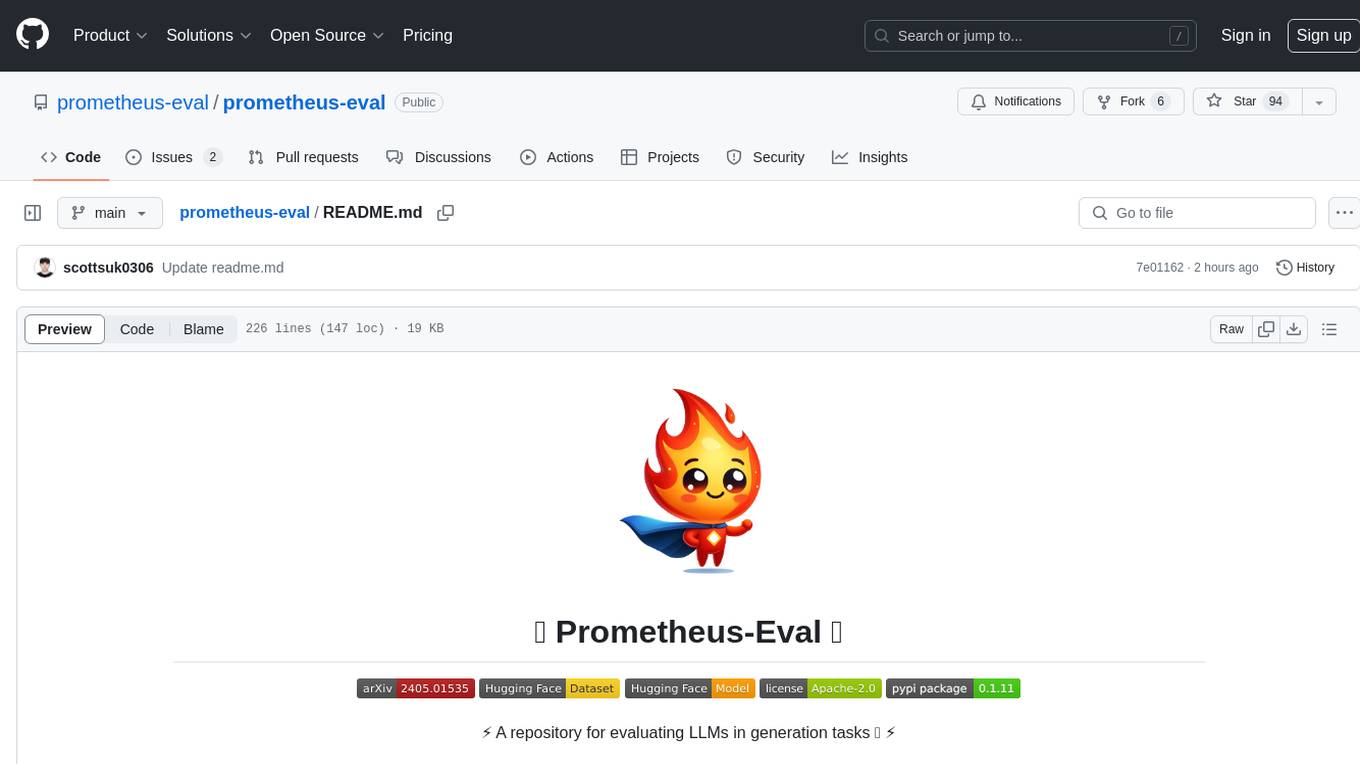
prometheus-eval
Prometheus-Eval is a repository dedicated to evaluating large language models (LLMs) in generation tasks. It provides state-of-the-art language models like Prometheus 2 (7B & 8x7B) for assessing in pairwise ranking formats and achieving high correlation scores with benchmarks. The repository includes tools for training, evaluating, and using these models, along with scripts for fine-tuning on custom datasets. Prometheus aims to address issues like fairness, controllability, and affordability in evaluations by simulating human judgments and proprietary LM-based assessments.

Me-LLaMA
Me LLaMA introduces a suite of open-source medical Large Language Models (LLMs), including Me LLaMA 13B/70B and their chat-enhanced versions. Developed through innovative continual pre-training and instruction tuning, these models leverage a vast medical corpus comprising PubMed papers, medical guidelines, and general domain data. Me LLaMA sets new benchmarks on medical reasoning tasks, making it a significant asset for medical NLP applications and research. The models are intended for computational linguistics and medical research, not for clinical decision-making without validation and regulatory approval.
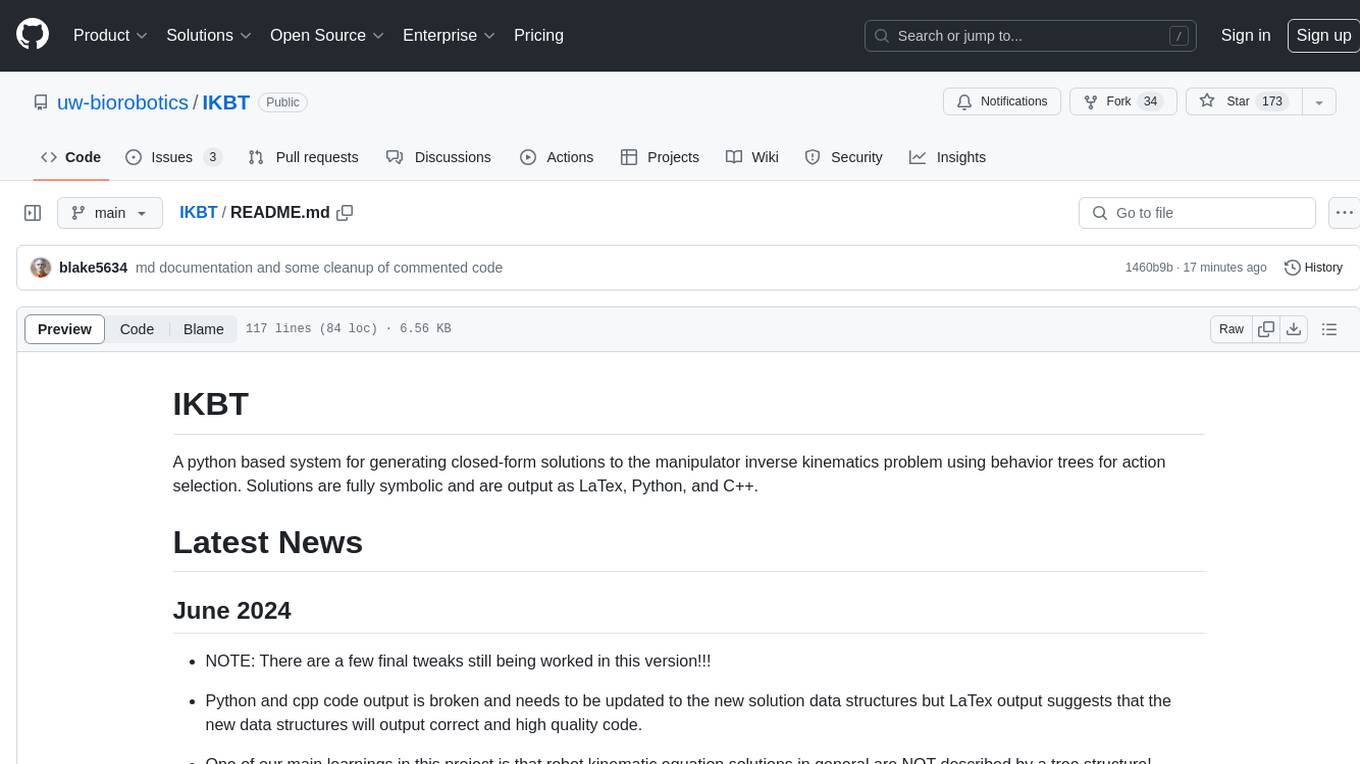
IKBT
IKBT is a Python-based system for generating closed-form solutions to the manipulator inverse kinematics problem using behavior trees for action selection. Solutions are fully symbolic and are output as LaTex, Python, and C++. The tool automates closed-form kinematics solving by organizing solution algorithms in a behavior tree, incorporating frequently used knowledge, generating a dependency graph of joint variables, and providing features for automatic documentation and code generation. It is implemented in Python with minimal dependencies outside of the standard Python distribution.
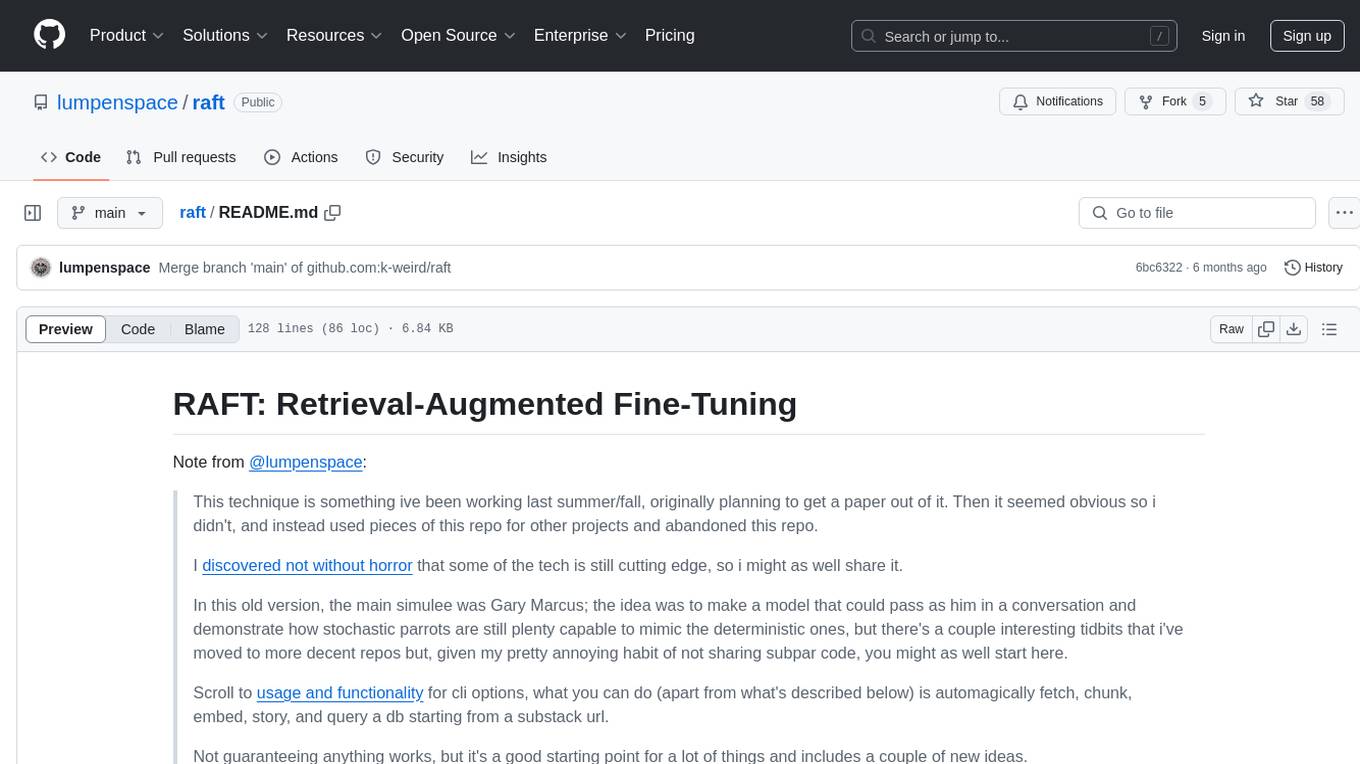
raft
RAFT (Retrieval-Augmented Fine-Tuning) is a method for creating conversational agents that realistically emulate specific human targets. It involves a dual-phase process of fine-tuning and retrieval-based augmentation to generate nuanced and personalized dialogue. The tool is designed to combine interview transcripts with memories from past writings to enhance language model responses. RAFT has the potential to advance the field of personalized, context-sensitive conversational agents.
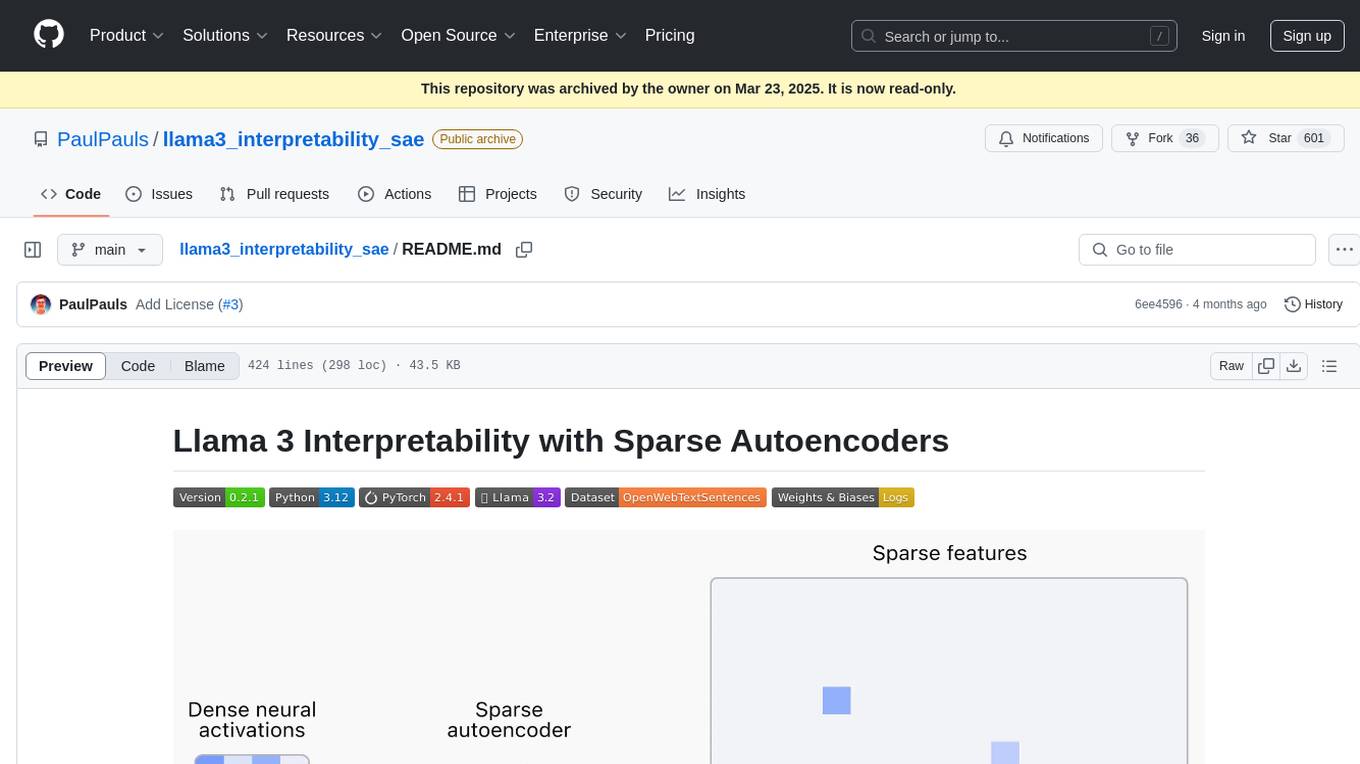
llama3_interpretability_sae
This project focuses on implementing Sparse Autoencoders (SAEs) for mechanistic interpretability in Large Language Models (LLMs) like Llama 3.2-3B. The SAEs aim to untangle superimposed representations in LLMs into separate, interpretable features for each neuron activation. The project provides an end-to-end pipeline for capturing training data, training the SAEs, analyzing learned features, and verifying results experimentally. It includes comprehensive logging, visualization, and checkpointing of SAE training, interpretability analysis tools, and a pure PyTorch implementation of Llama 3.1/3.2 chat and text completion. The project is designed for scalability, efficiency, and maintainability.
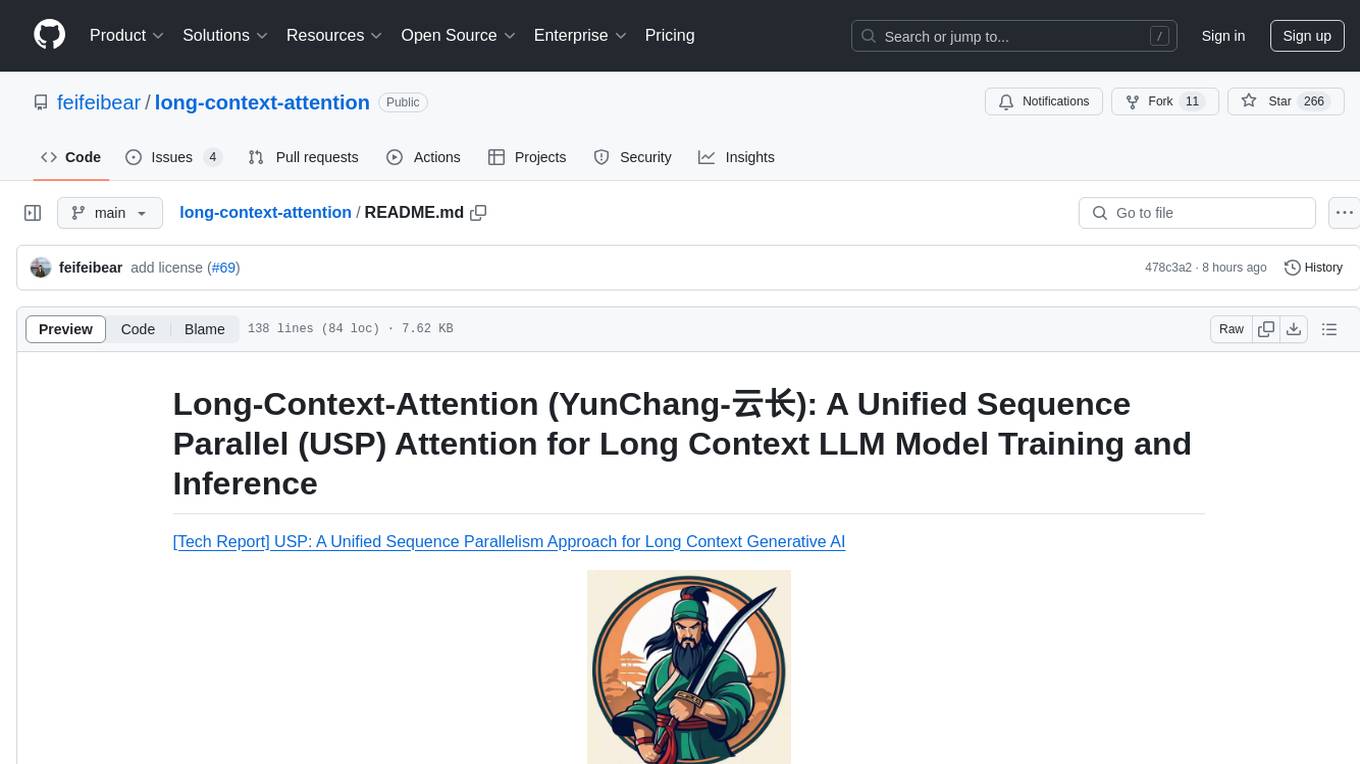
long-context-attention
Long-Context-Attention (YunChang) is a unified sequence parallel approach that combines the strengths of DeepSpeed-Ulysses-Attention and Ring-Attention to provide a versatile and high-performance solution for long context LLM model training and inference. It addresses the limitations of both methods by offering no limitation on the number of heads, compatibility with advanced parallel strategies, and enhanced performance benchmarks. The tool is verified in Megatron-LM and offers best practices for 4D parallelism, making it suitable for various attention mechanisms and parallel computing advancements.
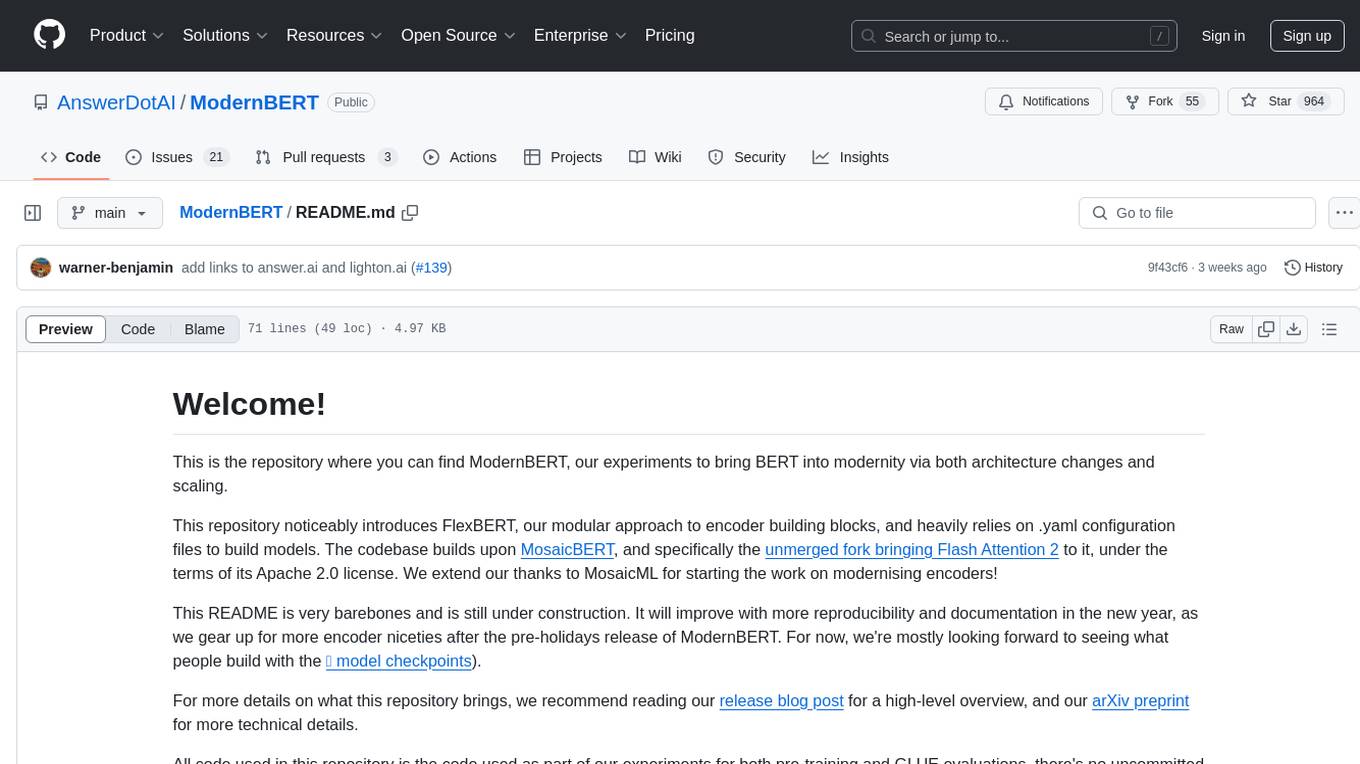
ModernBERT
ModernBERT is a repository focused on modernizing BERT through architecture changes and scaling. It introduces FlexBERT, a modular approach to encoder building blocks, and heavily relies on .yaml configuration files to build models. The codebase builds upon MosaicBERT and incorporates Flash Attention 2. The repository is used for pre-training and GLUE evaluations, with a focus on reproducibility and documentation. It provides a collaboration between Answer.AI, LightOn, and friends.
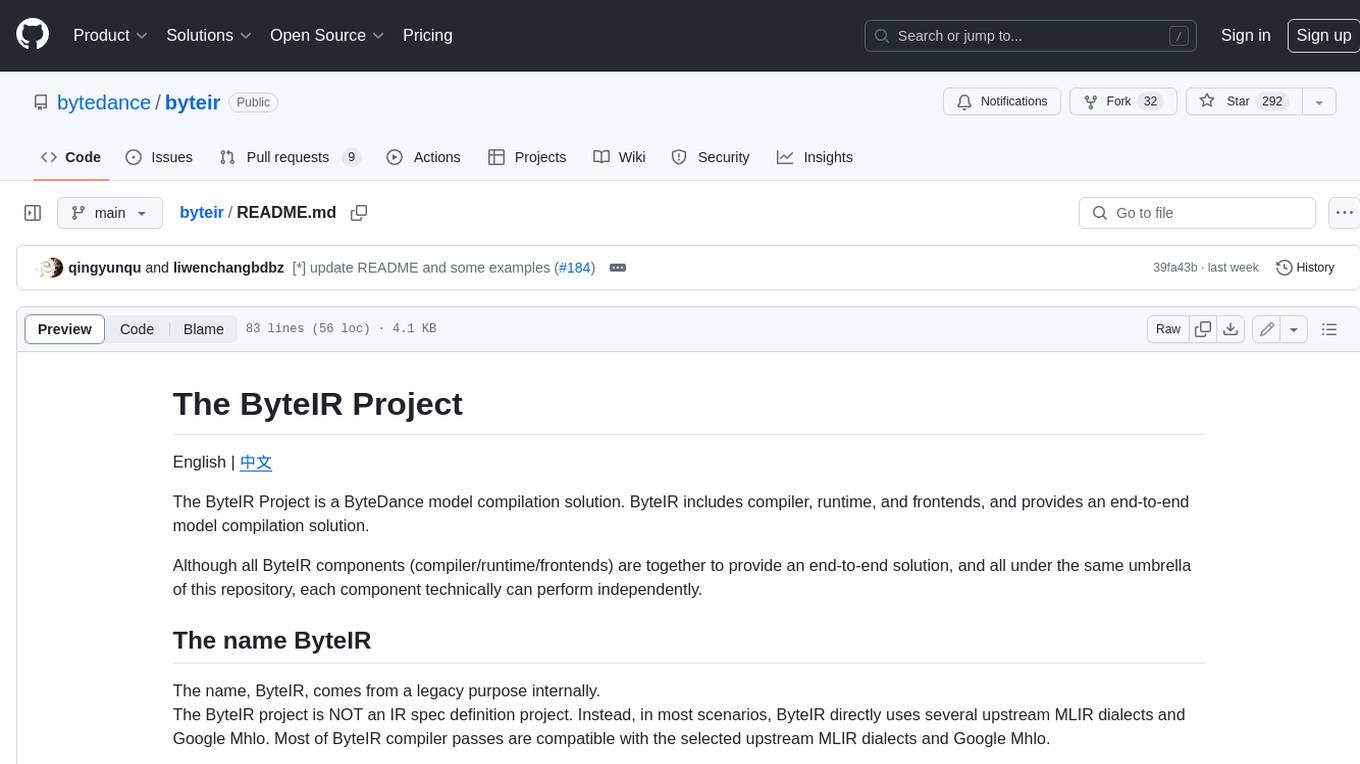
byteir
The ByteIR Project is a ByteDance model compilation solution. ByteIR includes compiler, runtime, and frontends, and provides an end-to-end model compilation solution. Although all ByteIR components (compiler/runtime/frontends) are together to provide an end-to-end solution, and all under the same umbrella of this repository, each component technically can perform independently. The name, ByteIR, comes from a legacy purpose internally. The ByteIR project is NOT an IR spec definition project. Instead, in most scenarios, ByteIR directly uses several upstream MLIR dialects and Google Mhlo. Most of ByteIR compiler passes are compatible with the selected upstream MLIR dialects and Google Mhlo.
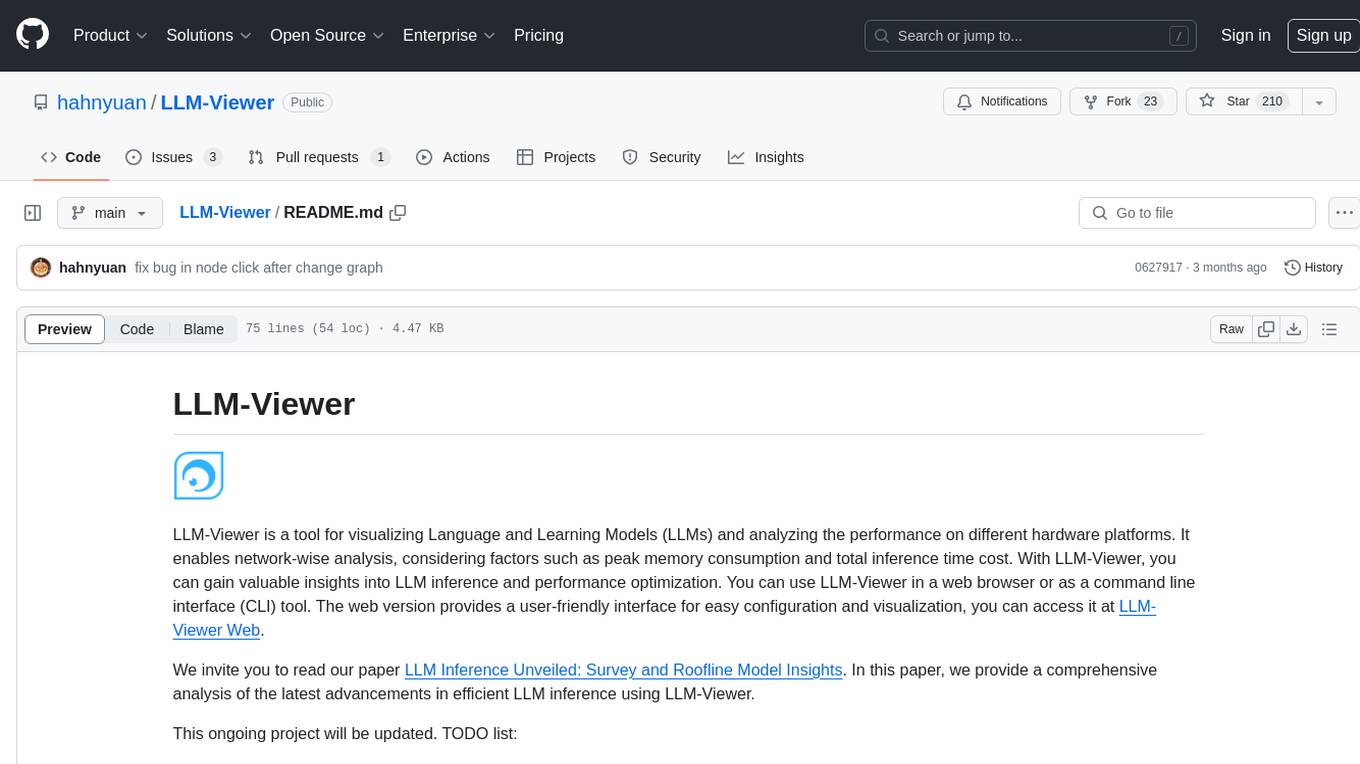
LLM-Viewer
LLM-Viewer is a tool for visualizing Language and Learning Models (LLMs) and analyzing performance on different hardware platforms. It enables network-wise analysis, considering factors such as peak memory consumption and total inference time cost. With LLM-Viewer, users can gain valuable insights into LLM inference and performance optimization. The tool can be used in a web browser or as a command line interface (CLI) for easy configuration and visualization. The ongoing project aims to enhance features like showing tensor shapes, expanding hardware platform compatibility, and supporting more LLMs with manual model graph configuration.
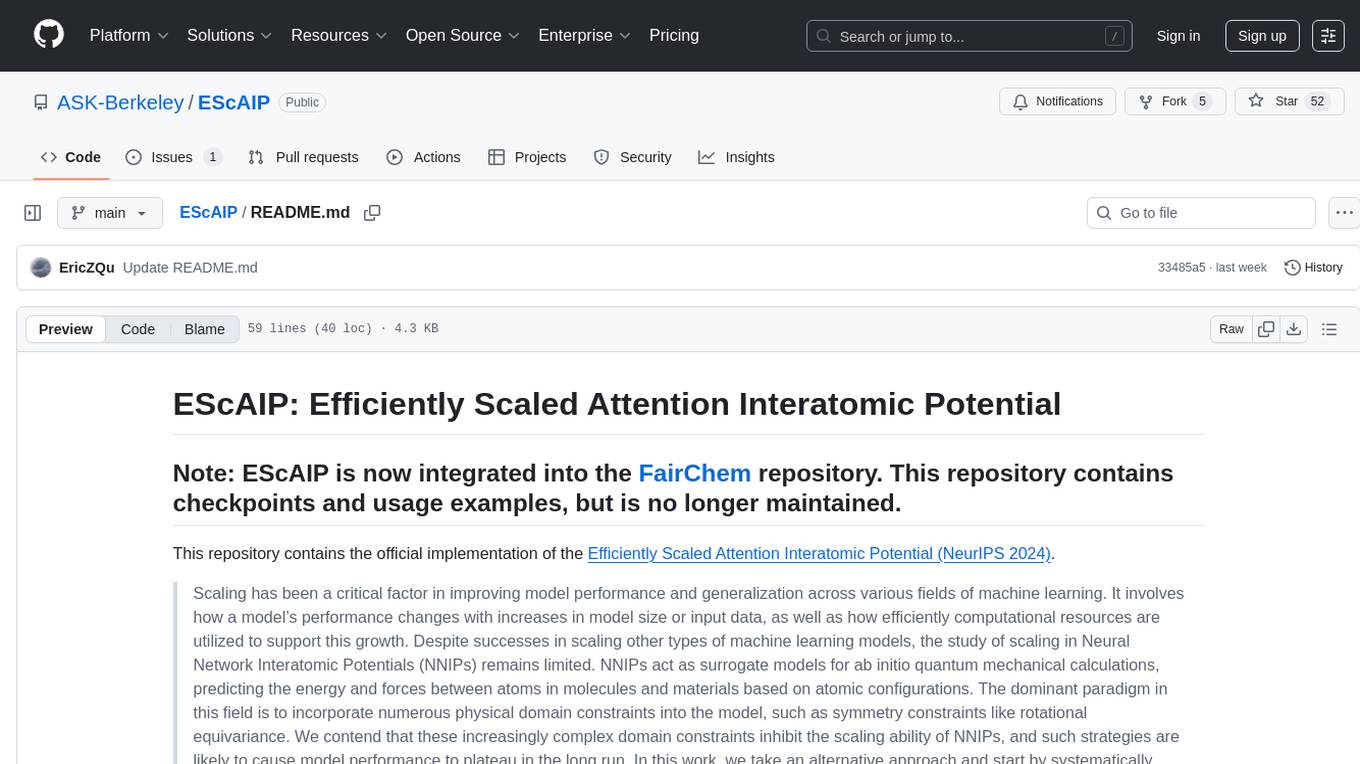
EScAIP
EScAIP is an Efficiently Scaled Attention Interatomic Potential that leverages a novel multi-head self-attention formulation within graph neural networks to predict energy and forces between atoms in molecules and materials. It achieves substantial gains in efficiency, at least 10x speed up in inference time and 5x less memory usage compared to existing models. EScAIP represents a philosophy towards developing general-purpose Neural Network Interatomic Potentials that achieve better expressivity through scaling and continue to scale efficiently with increased computational resources and training data.
For similar tasks

LLMSpeculativeSampling
This repository implements speculative sampling for large language model (LLM) decoding, utilizing two models - a target model and an approximation model. The approximation model generates token guesses, corrected by the target model, resulting in improved efficiency. It includes implementations of Google's and Deepmind's versions of speculative sampling, supporting models like llama-7B and llama-1B. The tool is designed for fast inference from transformers via speculative decoding.
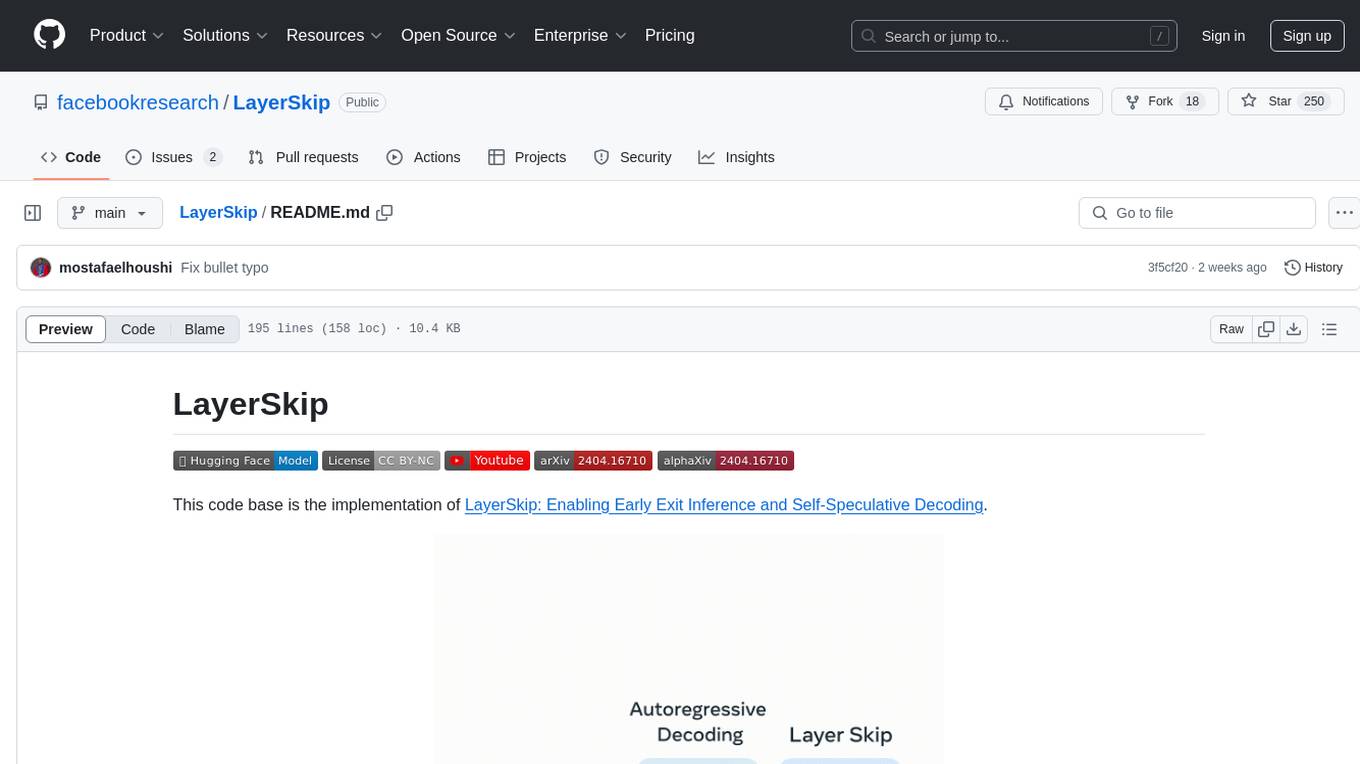
LayerSkip
LayerSkip is an implementation enabling early exit inference and self-speculative decoding. It provides a code base for running models trained using the LayerSkip recipe, offering speedup through self-speculative decoding. The tool integrates with Hugging Face transformers and provides checkpoints for various LLMs. Users can generate tokens, benchmark on datasets, evaluate tasks, and sweep over hyperparameters to optimize inference speed. The tool also includes correctness verification scripts and Docker setup instructions. Additionally, other implementations like gpt-fast and Native HuggingFace are available. Training implementation is a work-in-progress, and contributions are welcome under the CC BY-NC license.

LLamaWorker
LLamaWorker is a HTTP API server developed to provide an OpenAI-compatible API for integrating Large Language Models (LLM) into applications. It supports multi-model configuration, streaming responses, text embedding, chat templates, automatic model release, function calls, API key authentication, and test UI. Users can switch models, complete chats and prompts, manage chat history, and generate tokens through the test UI. Additionally, LLamaWorker offers a Vulkan compiled version for download and provides function call templates for testing. The tool supports various backends and provides API endpoints for chat completion, prompt completion, embeddings, model information, model configuration, and model switching. A Gradio UI demo is also available for testing.

Pichome
PicHome is a powerful open-source cloud storage program that efficiently manages various types of files and excels in image and media file management. Its highlights include robust file sharing features and advanced AI-assisted management tools, providing users with a convenient and intelligent file management experience. The program offers diverse list modes, customizable file information display, enhanced quick file preview, advanced tagging, custom cover and preview images, multiple preview images, and multi-library management. Additionally, PicHome features strong file sharing capabilities, allowing users to share entire libraries, create personalized showcase web pages, and build complete data sharing websites. The AI-assisted management aspect includes AI file renaming, tagging, description writing, batch annotation, and file Q&A services, all aimed at improving file management efficiency. PicHome supports a wide range of file formats and can be applied in various scenarios such as e-commerce, gaming, design, development, enterprises, schools, labs, media, and entertainment institutions.
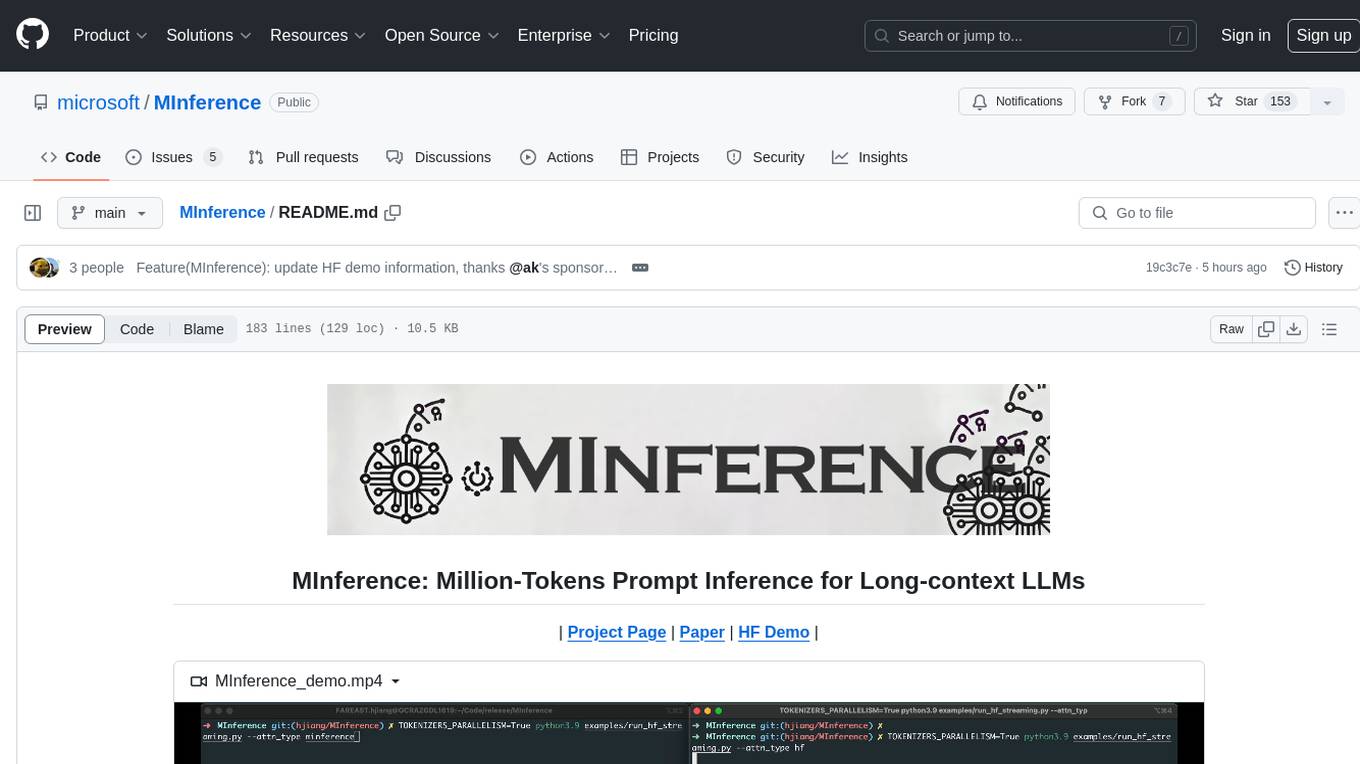
MInference
MInference is a tool designed to accelerate pre-filling for long-context Language Models (LLMs) by leveraging dynamic sparse attention. It achieves up to a 10x speedup for pre-filling on an A100 while maintaining accuracy. The tool supports various decoding LLMs, including LLaMA-style models and Phi models, and provides custom kernels for attention computation. MInference is useful for researchers and developers working with large-scale language models who aim to improve efficiency without compromising accuracy.
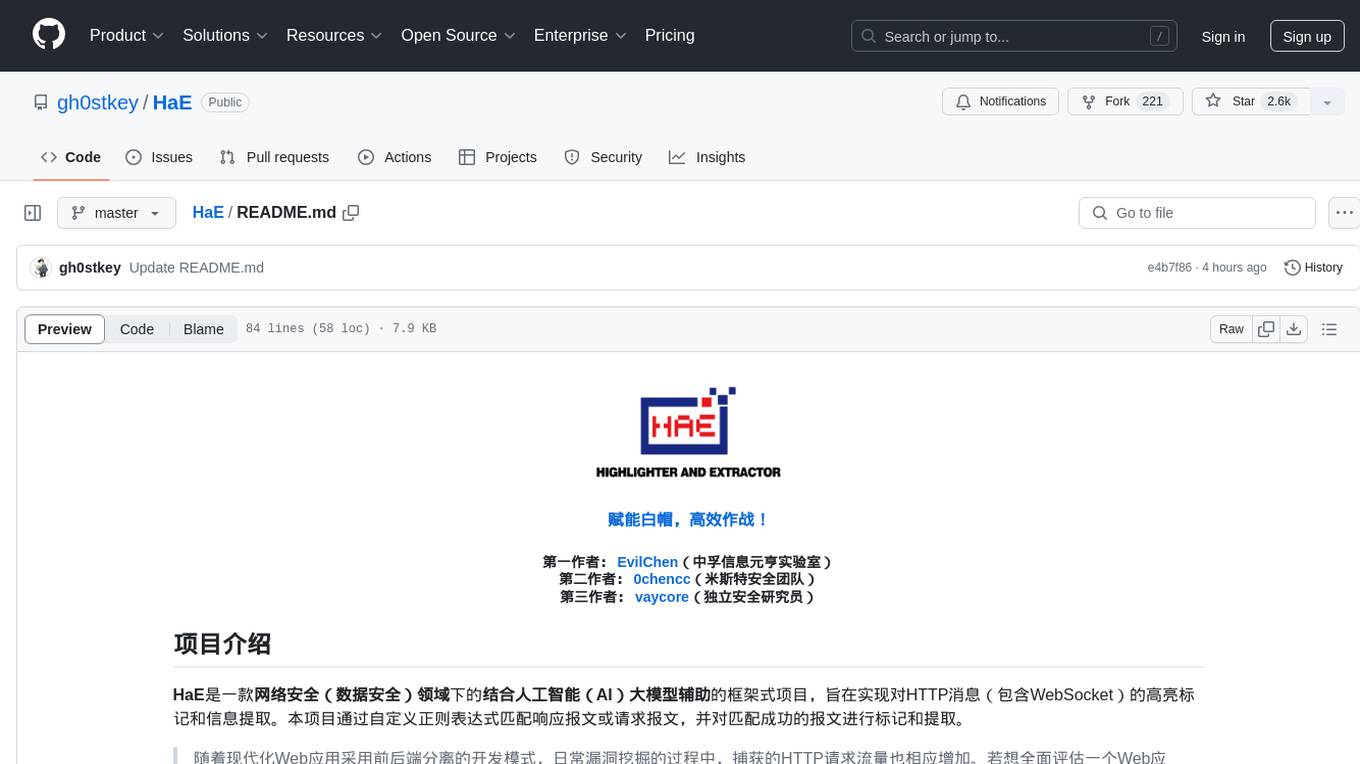
HaE
HaE is a framework project in the field of network security (data security) that combines artificial intelligence (AI) large models to achieve highlighting and information extraction of HTTP messages (including WebSocket). It aims to reduce testing time, focus on valuable and meaningful messages, and improve vulnerability discovery efficiency. The project provides a clear and visual interface design, simple interface interaction, and centralized data panel for querying and extracting information. It also features built-in color upgrade algorithm, one-click export/import of data, and integration of AI large models API for optimized data processing.
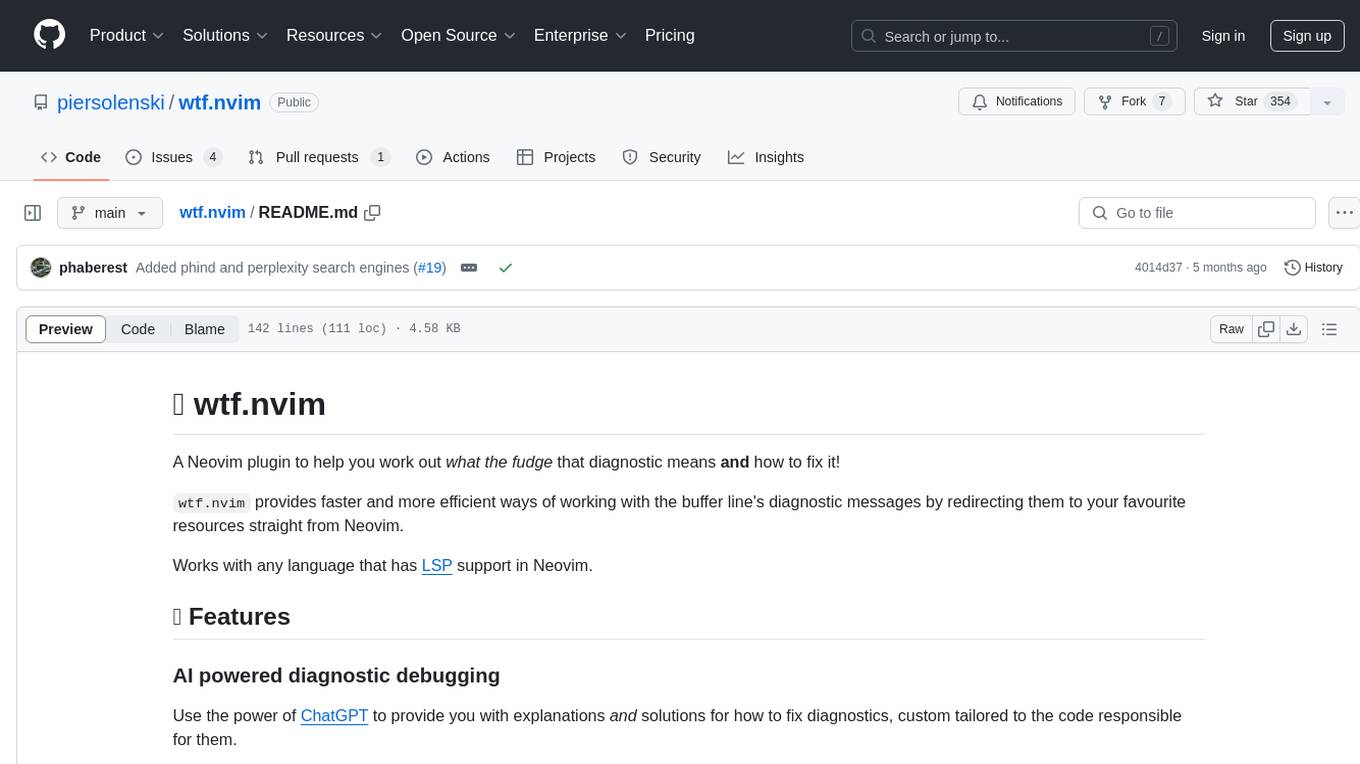
wtf.nvim
wtf.nvim is a Neovim plugin that enhances diagnostic debugging by providing explanations and solutions for code issues using ChatGPT. It allows users to search the web for answers directly from Neovim, making the debugging process faster and more efficient. The plugin works with any language that has LSP support in Neovim, offering AI-powered diagnostic assistance and seamless integration with various resources for resolving coding problems.
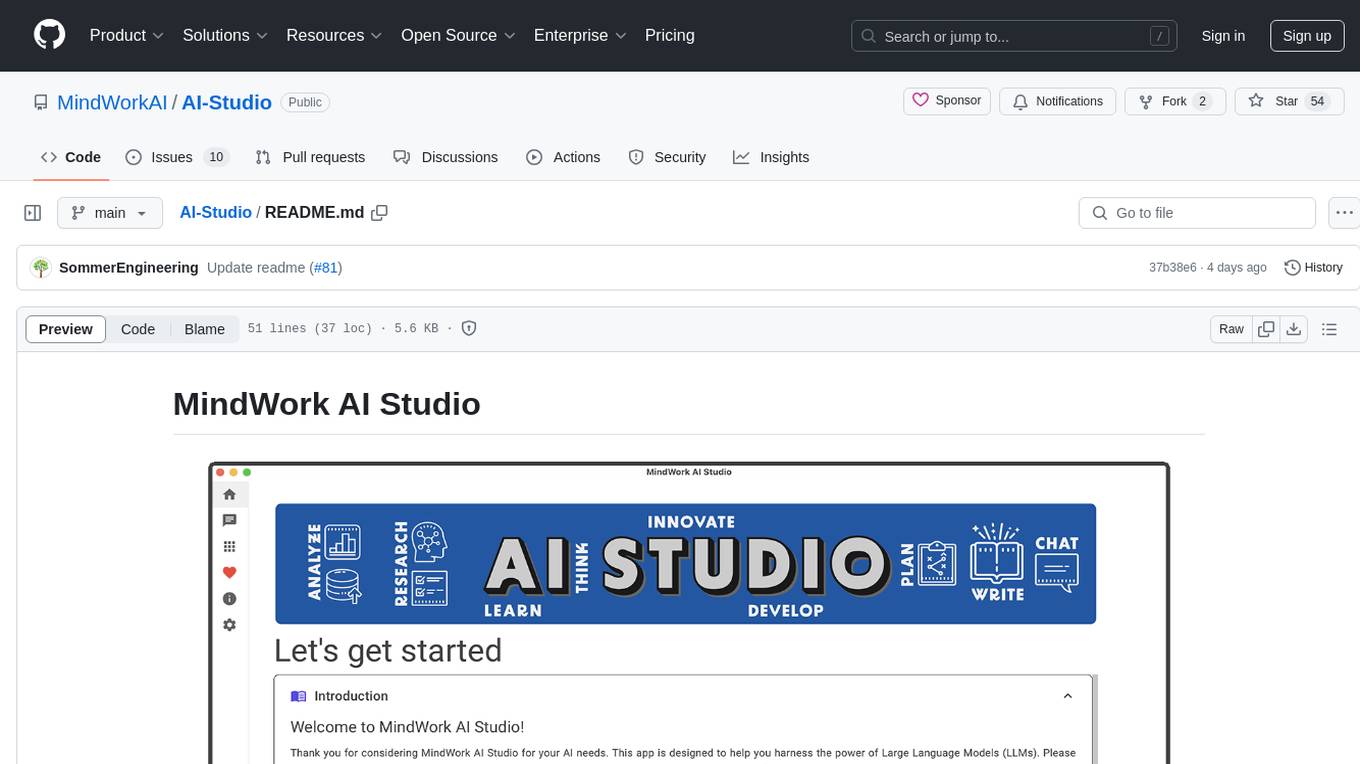
AI-Studio
MindWork AI Studio is a desktop application that provides a unified chat interface for Large Language Models (LLMs). It is free to use for personal and commercial purposes, offers independence in choosing LLM providers, provides unrestricted usage through the providers API, and is cost-effective with pay-as-you-go pricing. The app prioritizes privacy, flexibility, minimal storage and memory usage, and low impact on system resources. Users can support the project through monthly contributions or one-time donations, with opportunities for companies to sponsor the project for public relations and marketing benefits. Planned features include support for more LLM providers, system prompts integration, text replacement for privacy, and advanced interactions tailored for various use cases.
For similar jobs

sweep
Sweep is an AI junior developer that turns bugs and feature requests into code changes. It automatically handles developer experience improvements like adding type hints and improving test coverage.

teams-ai
The Teams AI Library is a software development kit (SDK) that helps developers create bots that can interact with Teams and Microsoft 365 applications. It is built on top of the Bot Framework SDK and simplifies the process of developing bots that interact with Teams' artificial intelligence capabilities. The SDK is available for JavaScript/TypeScript, .NET, and Python.

ai-guide
This guide is dedicated to Large Language Models (LLMs) that you can run on your home computer. It assumes your PC is a lower-end, non-gaming setup.

classifai
Supercharge WordPress Content Workflows and Engagement with Artificial Intelligence. Tap into leading cloud-based services like OpenAI, Microsoft Azure AI, Google Gemini and IBM Watson to augment your WordPress-powered websites. Publish content faster while improving SEO performance and increasing audience engagement. ClassifAI integrates Artificial Intelligence and Machine Learning technologies to lighten your workload and eliminate tedious tasks, giving you more time to create original content that matters.

chatbot-ui
Chatbot UI is an open-source AI chat app that allows users to create and deploy their own AI chatbots. It is easy to use and can be customized to fit any need. Chatbot UI is perfect for businesses, developers, and anyone who wants to create a chatbot.

BricksLLM
BricksLLM is a cloud native AI gateway written in Go. Currently, it provides native support for OpenAI, Anthropic, Azure OpenAI and vLLM. BricksLLM aims to provide enterprise level infrastructure that can power any LLM production use cases. Here are some use cases for BricksLLM: * Set LLM usage limits for users on different pricing tiers * Track LLM usage on a per user and per organization basis * Block or redact requests containing PIIs * Improve LLM reliability with failovers, retries and caching * Distribute API keys with rate limits and cost limits for internal development/production use cases * Distribute API keys with rate limits and cost limits for students

uAgents
uAgents is a Python library developed by Fetch.ai that allows for the creation of autonomous AI agents. These agents can perform various tasks on a schedule or take action on various events. uAgents are easy to create and manage, and they are connected to a fast-growing network of other uAgents. They are also secure, with cryptographically secured messages and wallets.

griptape
Griptape is a modular Python framework for building AI-powered applications that securely connect to your enterprise data and APIs. It offers developers the ability to maintain control and flexibility at every step. Griptape's core components include Structures (Agents, Pipelines, and Workflows), Tasks, Tools, Memory (Conversation Memory, Task Memory, and Meta Memory), Drivers (Prompt and Embedding Drivers, Vector Store Drivers, Image Generation Drivers, Image Query Drivers, SQL Drivers, Web Scraper Drivers, and Conversation Memory Drivers), Engines (Query Engines, Extraction Engines, Summary Engines, Image Generation Engines, and Image Query Engines), and additional components (Rulesets, Loaders, Artifacts, Chunkers, and Tokenizers). Griptape enables developers to create AI-powered applications with ease and efficiency.
